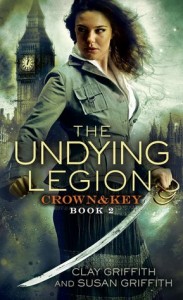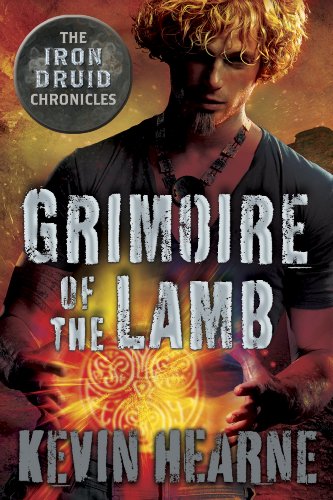 The Grimoire of the Lamb (The Iron Druid Chronicles, #0.4) by Kevin Hearne
The Grimoire of the Lamb (The Iron Druid Chronicles, #0.4) by Kevin Hearne Formats available: ebook, audiobook
Series: Iron Druid Chronicles #0.4
Pages: 64
Published by Del Rey on May 7th 2013
Purchasing Info: Author's Website, Publisher's Website, Amazon, Barnes & Noble, Kobo
Goodreads
There's nothing like an impromptu holiday to explore the birthplace of modern civilisation, but when Atticus and Oberon pursue a book-stealing Egyptian wizard - with a penchant for lamb - to the land of the pharaohs, they find themselves in hot, crocodile-infested water.
The trip takes an even nastier turn when they discover the true nature of the nefarious plot they've been drawn into. On the wrong side of the vengeful cat goddess Bast and chased by an unfathomable number of her yowling four-legged disciples, Atticus must find a way to appease or defeat Egypt's deadliest gods - before his grimoire-grabbing quarry uses them to turn him into mincemeat.
My Review:
With great power comes great responsibility, at least according to the Spiderman mythos. But there are plenty of people who want that great power, but want to completely sidestep that whole great responsibility price tag. While history and politics are both littered with the bodies of the victims of those “great” figures, in urban fantasy that shortcut to great power usually travels down the road to hell, often paved with no good intentions whatsoever. That shortcut is nearly always dark magic.
And so it proves in Grimoire of the Lamb.
The Druid now known as Atticus O’Sullivan is 21. That’s 21 centuries old, not 21 years. But his magic keeps him looking much closer to 21 years old, and if that’s what people want to assume, he’s happy to let them.
While Atticus isn’t old enough to have visited Egypt when the pyramids were built, he is more than old enough to have visited Egypt before the Library at Alexandria was burned to the ground. And that long ago bit of library looting is the root of this story.
In the 21st century, Atticus lives in Tempe, near Arizona State University, and owns a shop that sells a combination of new age trinkets, minor magical items for the knowledgeable practitioner, arcane-seeming (and sometimes really arcane) used books and very special herbal teas that help students study just before exams.
While Atticus does seem to sell a few safe or relatively safe used books, most of his collection belongs in the Restricted Section at Hogwarts, or the nearest local equivalent, which happens to be a magically locked case in his shop.
And that case contains at least two books that are on semi-permanent loan from the defunct Library of Alexandria. One is that Grimoire of the Lamb, which Atticus believes is an ancient cookbook. The other is a book he calls Nice Kitty, which he describes somewhat like an illustrated guide to tantric sex to be practiced in the worship of Bast.
Bast is not happy that Atticus has that book. She’s so unhappy, in fact, that Atticus has avoided going to Egypt for centuries. But now he’s stuck.
An evil wizard has just stolen the cookbook, but only after informing Atticus that it isn’t a cookbook. That poor lamb isn’t for dinner, it’s a blood sacrifice to one of the ancient Egyptian gods. And it’s a sacrifice that will let the sorcerer kill his (and his god’s) enemies and place himself in a position of power. Someone has seriously given in to the dark side of the Force, and not just because he discovered the book by conjuring up a demon.
So Atticus, along with his faithful Irish wolfhound Oberon, takes off for Egypt to track down that stolen (or is that re-stolen) book, before it’s too late.
Escape Rating B+: I was looking for something quick and fun, and this certainly filled the bill. I was tempted to say light and fun, but Atticus often isn’t light. There are always plenty of humorous moments, if only within the confines of Atticus’ own thoughts, but there’s also always something darker at work.
And even if Atticus doesn’t provide a lot of levity, Oberon always does. When Bast’s many, many, MANY minions chase Atticus and Oberon through the streets of Cairo, poor Oberon’s attempts to visualize just how many cats are following them nearly breaks the poor dog’s enhanced brain. Bast commands a lot of cats. All the cats. And they all chase Atticus and Oberon with a vengeance. Possibly literally.
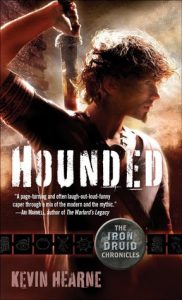 Grimoire of the Lamb is a prequel story to the Iron Druid Chronicles. Although it takes place before the absolutely marvelous Hounded, it was written after it, so while it introduces the characters we are familiar with, it also already knows who they are and what they are supposed to be.
Grimoire of the Lamb is a prequel story to the Iron Druid Chronicles. Although it takes place before the absolutely marvelous Hounded, it was written after it, so while it introduces the characters we are familiar with, it also already knows who they are and what they are supposed to be.
This story is more intimate than Hounded in that the only two characters that we are familiar with are Atticus and Oberon. His werewolf lawyer appears in a phone call, but doesn’t participate in the action. This one is all on the druid and his dog.
Especially on Atticus. Just as in Hounded, the story is written in first-person singular, so we are always inside Atticus’ head, even when he’s gibbering to himself in pain. Which is often. Atticus gets knocked around a lot.
Tangling with a crocodile, let alone a crocodile god, is always messy. Especially when, as so often happens with Atticus, he’s making it all up as he goes along.
One of the fun things about this series is the way that it mixes multiple ancient mythologies with contemporary sensibilities. Atticus has survived by adapting from century to century and country to country. He never forgets who he is, where he comes from, or what he remembers, but he doesn’t cling to the dead past. There’s probably a lesson in there someplace.
Most of the time when Atticus is forced to deal with myths, legends and deities, they are from his own Celtic pantheon. But he remembers the other old gods, and they certainly remember him. Bast certainly does. And will. He’s planning to steal Nice Kitty back, as soon as he heals up from dealing with Sobek the Crocodile God. Hopefully for the last time.
But this is certainly not my last time visiting Atticus and Oberon.

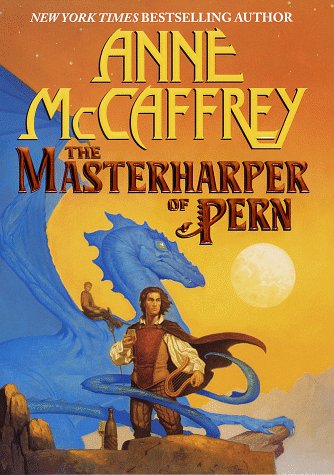 The MasterHarper of Pern by
The MasterHarper of Pern by 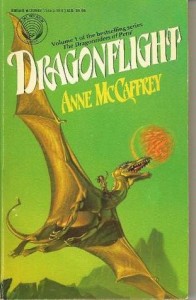 Most any Pern fan will tell you that the best way to read the series is
Most any Pern fan will tell you that the best way to read the series is 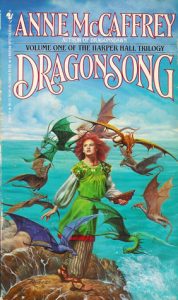 Escape Rating: A-. The great strength of this book, in my opinion, is that it ties together a great many loose threads from a whole bunch of other books. For instance, why did Petiron (yes, the same one) not communicate better with the MasterHarper in
Escape Rating: A-. The great strength of this book, in my opinion, is that it ties together a great many loose threads from a whole bunch of other books. For instance, why did Petiron (yes, the same one) not communicate better with the MasterHarper in 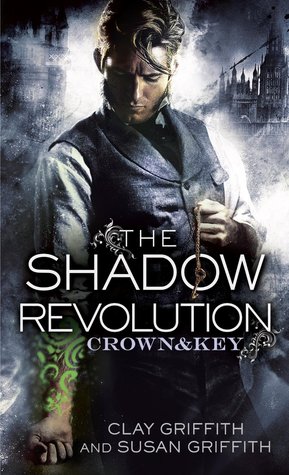 The Shadow Revolution (Crown & Key, #1) by
The Shadow Revolution (Crown & Key, #1) by 